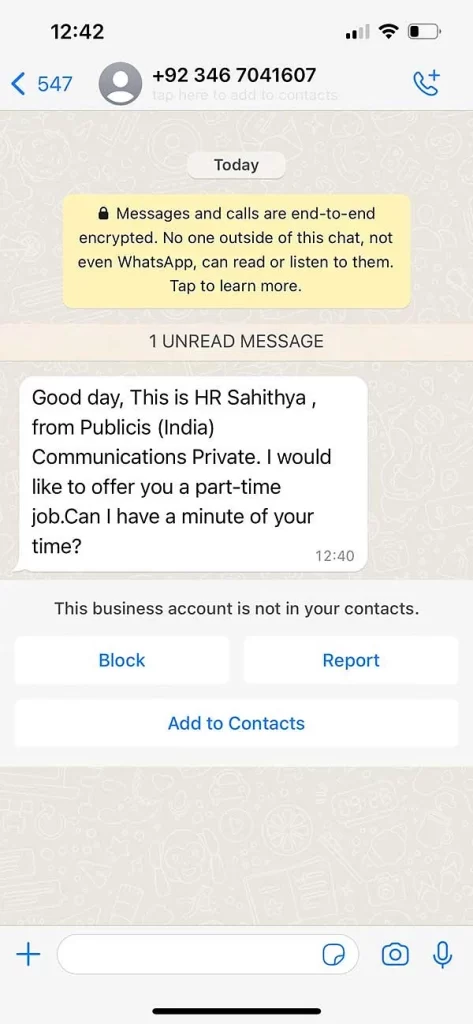Scammers have been posing as recruiters from top ad agencies to lure people in with promises of plum jobs and projects, swindling money from them in the process
Here’s a headline we never hoped to write, but the Indian ad world has now been beset by the scammer problem. Scores of Indians fall prey to phone scammers every day. Newspapers are rife with stories of bank accounts being wiped out or credit cards being swiped for ungodly amounts. Technology is evolving too rapidly for people to keep up with, making the general public susceptible to scams, spams and crimes.
Taking a leaf from Netflix series Jamtara, sweet-talking scammers have been targeting people pretending to be executives from top Indian advertising agencies. Conversations typically start on WhatsApp and are then continued on Telegram. The modus operandi is to lure people in the name of jobs, win their trust by paying for one or two jigs and then later coaxing them to invest in cryptocurrency. Victims of these scammers have lost a lot of money in the process.
It’s unclear why only ad agencies and executives are being targeted by the scammers. Ogilvy’s Chief Talent Officer Monty Bharali believes that the criminals are cashing in on the hard-earned reputation of top agencies to increase the likelihood of response from the victims.
Said a dentsu spokesperson: “Fraudsters have been representing themselves as denstu employees or agents. They send such messages in connection with subscriptions to social media channels in exchange for monetary returns, jobs in dentsu or similar matters and offer monetary returns.”
Rita Verma, President & Head – HR, DDB Mudra Group, said, “The rise in scam calls or texts offering fraudulent full-time and part-time jobs under the company name is a concern for us.
“Post the pandemic, WFH has become a big lure for people to get scammed. There have been many lay-offs and there are many desperate for employment who fall prey to such activities,” said Krishna Iyer, Director – Marketing at MullenLowe Lintas Group. “Posing as an ad agency has become one more way to bait the unaware. The scammers just cast the net wide and there will be some fish to catch.”
Some chats that we came across of scammers are posing as agencies:


Agencies fight back
With scammers name dropping agencies, the onus is on advertising companies to warn people against the scammers. Many agencies as well as top executives have taken to their social media platforms to spread awareness about the scammers.
He assured that the agency has been doing its bit to prevent more people from falling prey to these scams. “To start off with, when we first encountered this misuse of the Ogilvy name, we lodged the necessary formal complaints with the cybercrime cell, we have also made sure using our social media handles we communicate to any potential victims that Ogilvy India doesn’t extend such communication to offer such jobs and services via such entities. We truly believe that everyone must stay vigilant against what clearly seems like widespread fraud,” said Bharali.
“As soon as we receive queries regarding suspicious activities a prompt response is sent advising recipients not to engage. We also publish warnings on our website to discourage any involvement. As an agency, we take all necessary measures to protect our company’s reputation. Additionally, we work closely with our legal advisors to initiate appropriate legal action against the scammers, while also reporting the matter to the Cyber Crime Unit for further,” said Iyer.
Even denstu assured that it has been working with the law enforcement authorities to report such matters as and when they crop up.
“None of the entities or brands of dentsu pay people for writing reviews or subscribing or liking to channels on any digital platforms such as YouTube, Instagram, or for such jobs in dentsu. You may report such fraudulent incidents by writing to us at Connect.India@dentsu.com. Any money transaction for any such actions is at your own risk and dentsu will not be liable for any such loss or damages,” said the spokesperson.
Verma clarified that the DDB Mudra Group does not approach or encourage individuals to plant reviews for products or services. “Moreover, the DDB Mudra Group will never ask for any kind of monetary investment or compensation in exchange for jobs.”
To counter the menace, the Group has been placing great emphasis on cyber security training with multiple refreshers in a year. “While we have safeguards in place, courtesy of our incredible IT team, identifying threats at an individual level works best. Data security is a modern necessity, and every individual must practice it”, she said.
Mirum India CEO Hareesh Tibrewala shared a four-point method to identify scammers.
“One, check the email ID from you got the message very carefully. Most of the time, the company name will be misspelt in the email ID,” he said.
“Two, verify from the company website if there is actually position available that is being offered to you and does that position require you to pass any test if at all. Three, check on Linkedin the profile of the person offering the job to see if it is a genuine profile. And four, normally no reputed company will ask you to take some specific certification (that requires upfront payment) before applying for a job,” shared Tibrewala.
But to a sophisticated scammer, the sky is the limit when it comes to ingenuity.
“I have seen cases of very sophisticated scammers who will go to the extent of creating a duplicate company website (with some misspelling) as well creating numerous fake Linkedin profiles of people in the organisation so as to sound very authentic. In this specific case, the only way one realized that this was a scam was because the company domain name and the recruitment agency domain name were registered on the same day in the name of the same person,” he said sharing an anecdote of his experience.
Reiterating Tibrewala’s point, Iyer said that no legitimate organisations request upfront payment and that itself should serve as a red flag. “Seek clarification or further information directly from the company. Checking reviews or feedback from multiple sources. Be cautious when encountering text messages offering payment for watching videos or requests for upfront payments or offering jobs from unfamiliar phone numbers or email addresses. Trust your instincts and seek advice from trusted sources if any offer or situation seems too good to be true. If you come across any suspicious activity, report it immediately to the appropriate authorities. Stay vigilant to reduce the risk of falling victim to such scams,” he concluded.





































